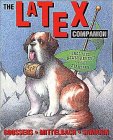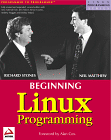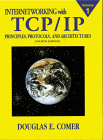As part of the migration from gimpster.com I found an old page of mine
where I describe some of the books I own. Back then the plan was that
people would click on my links to Amazon, in which my referrer code
was put so that I would make lots of money! :-) No such plans this
time — here’s just what I wrote about my books:
The LaTeX Companion
 Michel Goossens, Frank Mittelbach, Alexander Samarin
Michel Goossens, Frank Mittelbach, Alexander Samarin
Addison Wesley Longman Publishing Co; ISBN: 0201541998
This is probably the most comprehensive treatment of LaTeX you’ll
find. Although it getting slightly old, it’s still the best reference.
Update: The newly published (April 2004) second edition is
completely updated and is much larger. I can highly recommend it for
anybody who is serious about learning LaTeX. The book covers a huge
number of the available packages for LaTeX in addition to describing
the basic commands.
Beginning Linux Programming
 Richard Stones, Neil Matthew
Richard Stones, Neil Matthew
Wrox Press Ltd; ISBN: 1861002971
This book covers Linux programming — in all it’s variants from
simple shell-scripts to real GTK-programs written in C. I bought it
because I (obviously) wanted to learn about programming on Linux, but
I found out that it’s not a beginners book. You should at least have
some experience with C first, or else you won’t be able really enjoy
the code.
There’s also some rather lengthy chapters on terminal I/O, which are
somewhat boring — but they will probably come in handy if I some day
actually need to know those things. The chapter that was of most
immediate use for me was the chapter on shell-scripts, which I still
use from time to time.
The C Programming Language
 Brian W. Kernighan, Dennis M. Ritchie
Brian W. Kernighan, Dennis M. Ritchie
Prentice Hall; ISBN: 0131103628
If you want to learn C, then why not learn it from the guys who
invented it? This book describes everything that is to be found in
the C language (the original version, not newer versions such as C99).
It introduces all the basics, and continues with things like pointers
and arrays. Most of the examples deal with text, so it can be a little
boring in the end. You are asked to write programs that can count
words, sentences etc…
But overall I think it’s a great book, and a true classic text in
computer science. And it’s a little book — not like the modern
computer books which all have to be these tomes with at least a
thousand pages. Being little, the book keeps its focus well and
explains you the C language in a plain and consice way.
Internetworking with TCP/IP, Vol 1: Principles, Protocols and Architecture
 Douglas Comer
Douglas Comer
Prentice Hall PTR; ISBN: 0130183806
This book covers TCP/IP and does a really good job. You get to know
all the low-level stuff that makes the Internet work, from different
types of networks to all the different protocols used.
It’s a nice book because it manages to explain all these things, and
yet it’s still a very readable book. (I’ve read the third edition of
the book, but I’m sure that the fourth edition is just as good :-)
PHP3: Programming Browser-Based Applications with PHP
 Dave Medinets
Dave Medinets
McGraw-Hill Professional Publishing; ISBN: 0071353429
This book gives you an introduction to PHP3: You start installing PHP,
and then moves on to more daunting tasks…
But unfortunately the book is just an introduction. It just scratches
subjects such as object-oriented programming (OO) and XML, but the
reason for that might be, that these things weren’t as well supported
in PHP3 as they are in PHP4. (And now with PHP5 the book is very
quickly becoming obsolete…)
I got the book as a gift, as I was starting to learn PHP. But I must
say, that it didn’t teach me that much. The ASCII table in the back
is handy, though :-)
Evil Geniuses in a Nutshell
 Illiad
Illiad
O’Reilly UK; ISBN: 156592861X
This is one of the greatest comic-books I’ve ever read. The jokes are
about computers, Windows etc — some of them are really hairy :-) But
that only make even more fun, when you figure out what they’re talking
about.
Highly recommended for everybody who deals with computers, especially
if they are into Linux and related things.
The Ultimate Hitchhiker’s Guide
 Douglas Adams
Douglas Adams
Crown Publications; ISBN: 0517149257
Every nerd has to read this one — or at least give it a try. Before
you’ve read it, there’s so many things that you’ll not understand,
including the Meaning of Life. After you’ve read it, you’ll know that
the answer to the Ultimate Question is ‘42′.
I started reading the book, but only managed to read the first 250 of
the 800+ pages. The story-line was just too strange for my taste.
 The [Debian][] release manager Steve Langasek has announced that
Sarge is now frozen! The plan is to make the release at the end of this month.
The [Debian][] release manager Steve Langasek has announced that
Sarge is now frozen! The plan is to make the release at the end of this month. Michel Goossens, Frank Mittelbach, Alexander Samarin
Michel Goossens, Frank Mittelbach, Alexander Samarin  Richard Stones, Neil Matthew
Richard Stones, Neil Matthew  Brian W. Kernighan, Dennis M. Ritchie
Brian W. Kernighan, Dennis M. Ritchie  Douglas Comer
Douglas Comer  Dave Medinets
Dave Medinets  Illiad
Illiad  Douglas Adams
Douglas Adams